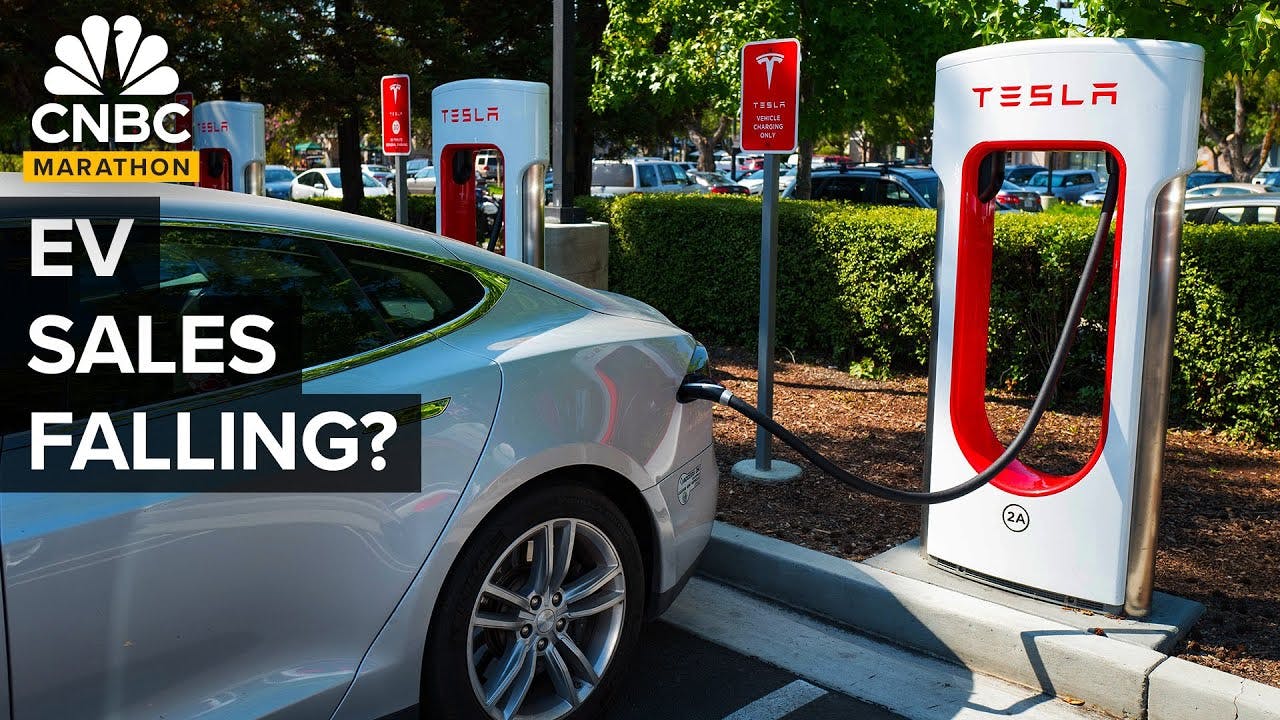Why EV Sales Are Falling | CNBC Marathon
()

Introduction (00:00:00)
- EV sales are slowing down.
- It took twice as long to sell an EV in the US in August 2023 compared to January 2023.
- Consumers still have range anxiety and lack know-how about EVs.
- EVs are still too expensive and have limitations in terms of usage.
Why EVs Are Piling Up At Dealerships In The U.S (Published October 2023) (00:00:34)
- Despite significant investments and government support, EV sales are slowing down due to concerns about long-distance travel, limited charging infrastructure, and high prices.
- Dealerships are experiencing an oversupply of EVs, leading automakers to adjust their strategies by ramping up production of hybrid vehicles and offering discounts on EVs.
- Several factors are contributing to the decline in EV sales, including softening demand for luxury EVs, larger economic challenges, inflexible supply chains, regulatory pressures, higher pricing compared to gasoline vehicles, changing buyer demographics, potential buyer remorse, and the transition to the Tesla charging standard.
- Tesla dominates the EV market with its aggressive pricing and supercharging network, while dealerships struggle with unsold EVs that don't meet consumer demand.
- The government should reassess regulatory pressures and incentives to encourage EV adoption, as the high prices, especially for Teslas, are a barrier to wider adoption.
- Transitioning to hybrid vehicles as a bridge to more advanced battery technology could have been a better approach, but despite the recent decline in EV sales, the number of buyers considering EVs is still higher compared to 2019.
- Consumers are willing to accept longer charging times and reduced range in EVs compared to traditional ICE vehicles, and used EV prices are decreasing, making them more affordable for budget-conscious consumers.
Why Used EV Prices Are Falling (Published December 2023) (00:17:21)
- Used EV prices significantly dropped in September and October 2023 compared to the same period in 2022, with some studies showing a decline of around 30%.
- The mainstream appeal of EVs is lacking due to high prices, limited usage, and concerns about range anxiety.
- New EVs are accumulating on dealer lots, leading to lower-than-expected deliveries, with Tesla, the market leader, aggressively cutting prices.
- Used EV prices have experienced a steeper decline compared to overall used vehicle prices, with some studies indicating a drop of up to 33.7% for 1 to 5-year-old EVs.
- Hybrid vehicles are outperforming EVs in terms of value retention due to their higher fuel efficiency.
- The recent slowdown in EV sales growth raises questions about the rapid transition to electric vehicles, despite EV sales growth still outpacing combustion engine sales growth.
- The upcoming point-of-sale rebate for EVs in 2024 could lead to a surge in sales, but there are concerns about tightened eligibility requirements for the $7,500 tax credit on new EVs in 2023.
- Understanding the used EV market and EV depreciation is challenging due to limited data and the evolving nature of the EV market, particularly regarding battery technology.
Why Hertz's Bet On Tesla Isn't Paying Off In The U.S. (Published December 2023) (00:32:29)
- Hertz, a renowned car rental company, emerged from bankruptcy in 2021 with ambitious plans to acquire a substantial number of Tesla Model 3s and establish a network of fast chargers.
- Despite initial excitement, it was later clarified that there was no exclusive fleet deal or special contract between Hertz and Tesla.
- Hertz encountered challenges in its EV strategy, including pricing issues, high repair costs, and lower resale values, leading to internal debates about continuing or pausing the EV initiative.
- Hertz has significant acquisition agreements with Tesla, Polestar, and General Motors, but specific details remain undisclosed.
- The company aimed to convert a quarter of its fleet to electric, investing heavily in EVs, including $2.5 billion on Tesla vehicles alone.
- Despite Hertz's efforts, demand for EVs from corporate and private customers fell short of expectations due to range anxiety and limited knowledge about EVs.
- The rideshare segment proved to be the most successful for Hertz's EV fleet, with a significant portion of EVs utilized by rideshare drivers.
- Hertz faced challenges with high repair costs, particularly due to Tesla's reliance on mobile service fleets and prolonged wait times for spare parts and appointments.
- The decline in used EV values, especially Tesla's price cuts, negatively impacted Hertz's finances and reduced opportunities for profitable sales of used EVs.
- To mitigate risks, Hertz implemented measures such as requiring a minimum number of trips for drivers renting Teslas and reallocating underutilized EVs from leisure to rideshare.
- Hertz is investing in building out large-scale fast charging infrastructure, including Gigahubs at major airports, to support its EV fleet and attract customers.
- Despite challenges with its EV fleet, Hertz's overall performance remains strong, driven by profitable gasoline vehicle rentals.
- Hertz aims to gain a competitive advantage by continuing its investments in EVs and infrastructure, anticipating future growth in the car rental industry.